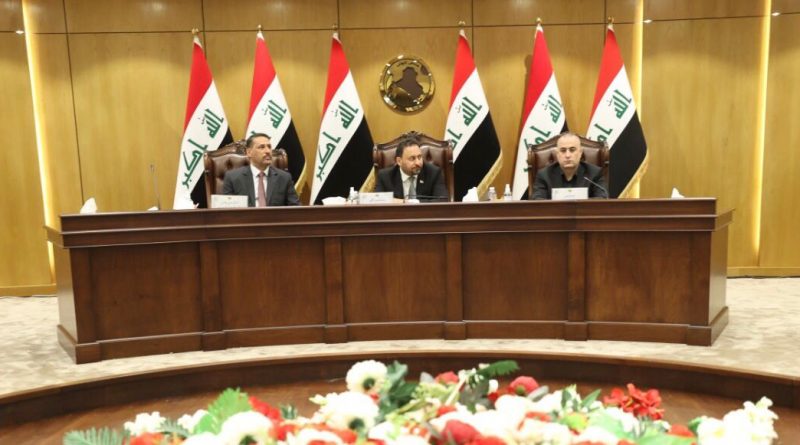Al-Kaabi chairs a dialogue session on the Health Insurance Law
Under the chairmanship of the First Deputy Speaker Mr. Hassan Karim al-Kaabi, the Council of Representatives organized in cooperation with the Ministry of Health and Environment a dialogue session under the title (Towards the Application of the Health Insurance Law to Ensure Health Security for Citizens) regarding the implementation of Health Insurance Law No. 22 of 2020.
During the session, which was held in the Constitutional Hall of the Council of Representatives, al-Kaabi welcomed the attendees, explaining that health legislation is directly related to the lives of citizens, and this can only be done with the presence of an integrated health sector. al-Kaabi indicated that the presence of the Ministry of Health, the supporting Ministries, the Parliamentary Health Committee, and the undersecretaries of Ministries, unions and others has a positive role in the maturation of the health insurance law, stressing that the Council of Representatives will spare no effort in serving the people and all that would provide health service.
Al-Kaabi thanked the cadres of the Ministry of Health for their efforts in confronting the Corona pandemic and providing health services, warning of the need to take into account the media aspect to educate citizens to pay attention to the health aspect.
The Deputy Chairman of the Health Committee, Jawad Al-Moussawi, presented the committee’s observations on the application of the law, including the formation of the Insurance Authority within six months of voting on the law, registering citizens, obligating all employees to participate, creating a special database and issuing the guarantee card, as well as the percentage and duration of deductions, in addition to issuing instructions for its implementation, stressing that The adoption of the law is a positive milestone in the application of its paragraphs and has a turning point in the provision of health services.
Committee member Hassan Khalati stated that the law went through several stages, as it was postponed due to controversial points, which led to the holding of a number of meetings and workshops to mature the provisions of the law. He stressed the committee’s readiness to provide the necessary support to the Ministry of Health in implementing the law.
For his part, the Technical Undersecretary of the Minister of Health, Dr. Hani Al-Uqabi, stated that the Ministry believes that there are several things that have delayed the provision of health and medical services to citizens, including the security conditions. He emphasized the need to build hospitals, open health centers and rehabilitate them to provide integrated medical services, as it is a major reason for the lack of services, adding that the application of the law will ensure the provision of the best services, in addition to the fact that the private sector will take its role in creating opportunities to provide services and competition between the public and private sectors, and that 60% of services are provided by the private sector.
Al-Uqabi added that the adoption of the law will change the provision of these services for the better, as the reluctance of investment to build hospitals with a large bed capacity of one hundred beds has caused the lack of service provision, which leads to many people traveling outside Iraq to receive treatment. He called on the Council of Representatives and the supporting Ministries to assist the Ministry in implementing the law to ensure the provision of the best medical services, with the importance of allocating funds by the Ministry of Finance to implement the law.
A presentation was made on the procedures for implementing the law by the Health Insurance Authority and the reasons for legislating the law and its objectives as they are among the basic and important elements in creating an environment of competition between the public and private sectors in the provision of services.
He pointed to the challenges facing the law due to the scarcity of funding, which led to the lack of providing the best services compared to the spending rate, in addition to the lack of health centers, financial burdens and health care costs.
An explanation was given about the structure of the authority and its branches in all governorates, its board of directors, and the allocation of the appropriate place for it, with the selection of the appropriate accounting system for the authority, with the creation of a database for the beneficiaries of the law in order to issue health insurance cards to them.
The dialogue session witnessed the opening of discussions and comments in order to implement the provisions of the law, taking into account the opinions of the technical authorities and issuing recommendations regarding it.
COR
Media Directorate
15/9/2021

